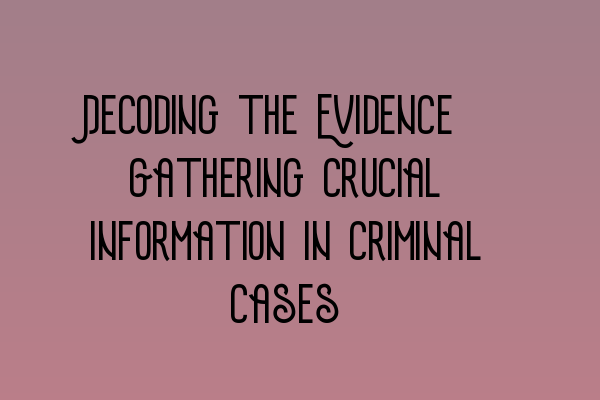Decoding the Evidence: Gathering Crucial Information in Criminal Cases
When it comes to criminal cases, gathering and decoding evidence is of utmost importance. The quality of evidence can significantly impact the outcome of a case, making it essential for legal professionals to possess the skills and knowledge to effectively gather and interpret this crucial information.
Understanding the Significance of Evidence
In criminal law, evidence serves as the cornerstone of proving or disproving a defendant’s guilt. It can include witness testimonies, physical objects, documents, photographs, videos, and more. Each piece of evidence contributes to building a comprehensive understanding of the events surrounding the alleged crime.
To gather evidence, legal professionals must initiate a meticulous investigation process. This involves interviewing witnesses, examining crime scenes, analyzing forensic reports, and reviewing documents. However, it’s not enough to collect evidence; it must be properly understood and decoded to present a compelling case in court.
The Role of Solicitors in Decoding Evidence
Solicitors play a key role in gathering and decoding evidence. They act as advocates for their clients, ensuring all relevant evidence is obtained and understood. By meticulously reviewing the evidence, solicitors can identify key details, inconsistencies, and potential issues that may impact the case.
Decoding evidence involves analyzing its credibility, relevance, and admissibility. Solicitors must assess the source of the evidence, the manner in which it was obtained, and any potential biases or motives. This critical evaluation helps shape the overall narrative and strategy for the defense or prosecution.
The Intersection of Technology and Evidence
In the digital age, technology has become an integral part of criminal investigations. Digital evidence, such as emails, social media posts, GPS data, and surveillance footage, can offer valuable insights into a case. Solicitors must be well-versed in utilizing advanced technology tools to gather, analyze, and present digital evidence effectively.
Furthermore, advanced data analysis techniques such as text mining, data visualization, and machine learning can aid in decoding complex evidence patterns. By leveraging these technologies, solicitors can uncover hidden connections, identify trends, and present compelling arguments.
Continuous Learning and Professional Development
Given the ever-evolving nature of criminal cases and the advancements in technology, legal professionals must continuously update their skills and knowledge. Participating in SQE 1 preparation courses and SQE 2 preparation courses can provide solicitors with the necessary expertise in evidence gathering and decoding.
Additionally, staying informed about SRA SQE exam dates is crucial for solicitors to plan their professional development effectively. Taking practice exams, such as the SQE 1 practice exam questions and SQE 1 practice mocks FLK1 FLK2, can help solicitors gauge their understanding of evidence-related topics and identify areas for improvement.
By continually investing in their professional development, solicitors can stay ahead of the curve, confidently navigate criminal cases, and provide the best possible representation for their clients.
Conclusion
Gathering and decoding evidence is a vital skill for legal professionals involved in criminal law. It requires meticulous attention to detail, critical thinking, and the ability to leverage technology effectively. By continuously updating their knowledge and skills through professional development courses, solicitors can ensure they are well-prepared to tackle the challenges of gathering and decoding evidence in criminal cases.
